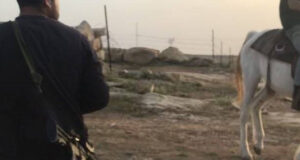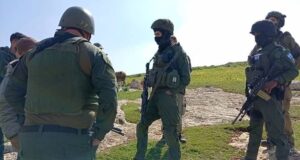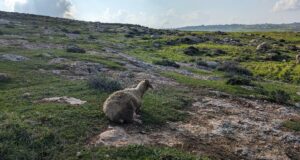By Saffron
6 August 2012 | International Solidarity Movement, West Bank
Armed Israeli settlers reinforced by the Israeli military regularly assault the villagers if Asira al-Qibliya. The settlers come from nearby colonies built in violation of International law, raid Asira al-Qibliya, throw stones, and shoot live ammunition.
The illegal settlers often enter Asira al-Qibliya, scream and knock on doors and windows simply for the psychological terror impact it has on the residents. At the same time, wheat and farmland is burned, olive trees are uprooted, and vital farmland is annexed by the illegal Israeli settlement of Yitzhar, making it difficult for Palestinians to secure a livelihood.
These threats have become a part of daily life in Asira al-Qibliya, a village located in the northern West Bank.
“A culture of fear.” This is how Nabila Saleh, a resident of the village, sees it.
“I never sleep more than a couple of hours each night. I jump at every sound,” says Nabila, “that is the way it is. Everybody fears a settler attack, even if they have not yet been attacked directly themselves.”
Nabila sits in her living room. Instead of glass panes in the windows are metal grids. This is the physical memory of a settler attack in November of last year, when settlers broke the windows of the Saleh’s and their neighbours’ homes, and the Israeli army followed by shooting tear-gas directly into the houses.
As she talks, Nabila’s children curiously creep into the living room. The youngest is especially shy. Nabila explains how the children of the village tend to be afraid of strangers. Many parents are afraid of letting their children go out and play, says Nabila. On Saturdays, the day of the Jewish Sabbath, when settler attacks are most likely to occur, hardly anyone dares to go out at all.
As Nabila is talking, she is suddenly interrupted by a whistling sound. The children immediately react by crying, “Jesh! Jesh!” – “Soldiers! Soldiers!”
Asira al-Qibliya has developed its own alarm system: when soldiers appear, the villagers warn each other by whistling. Nabila says she will instinctively jump at the sound of a whistle, even while doing her shopping in the city.
From Nabila’s roof, an Israeli military jeep and a group of soldiers are visible on a nearby hill where Yitzhar colony is located. Whistles and shouts of “jesh!” resound through the village.
The appearance of soldiers has become a prelude to a settler attack. Settlers do not attack or even enter the village alone. They arrive in groups and are often escorted by the military.
This time, it is a false alarm. After a while, the soldiers withdraw to a military base in the settlement. Asira al-Qibliya breathes a sigh of relief. But it is a short respite.
One of Nabila’s neighbours explained how only 15 meters from his family’s front door, a 22 year-old resident, Nimer Asaira, was shot in the head by a settler during an attack only one month ago. Miraculously, the young man survived, but lost his hearing. During the attack, the armed settlers were protected by the army.
The 20 year-old son of this neighbouring house witnessed the shooting, and helped to carry away Nimer as he bled. Since then, the young man has been sleepwalking. He has been in touch with a representative from Doctors Without Borders, who diagnosed the sleepwalking as a symptom of trauma and insisted that he be treated in Tel Aviv, where he is now receiving therapy.
“Of course, that is good for my son,” says his father, “but still, he is only one person. The entire village is traumatized.”
Altogether, the Yitzhar colony has annexed one third of the land belonging to the villages south of Nablus. Approximately 2 years ago, 50 dunums of the area Khusfe, farmland stretching from Asira al-Qibliya to the Huwara checkpoint, was annexed, burnt, and cleared by Yitzhar settlers.
Two times, villagers replanted their land, but the third time, the Israeli army declared the area a Closed Military Zone (CMZ), and prohibited the villagers from entering their land. The fields are still a CMZ, but now Israeli settlement buildings have been erected on them.
“I am very afraid,” says Khadra Abdelkarim, another resident of Asira al-Qibliya, “and my 6 children are very afraid. It is hard for them to focus in school.”
She recounts a recent nighttime settler attack, wherein a group of settlers knocked on doors and attack whoever would answer with pepper spray.
Khadra’s husband sums up the different rationales of the settler attacks. The settlers come to burn wheat and uproot olive trees in order to destroy livelihoods. They come on the occasion of Jewish holidays, the annual ones as well as the weekly sabbath. They come for retaliatory ‘price-tag’ attacks: if a settler is attacked or threatened anywhere in the occupied West Bank, or if the state of Israel is reconsidering settlement policy, Palestinian villages are forced to pay the price. Most importantly, they come to create unease among the Palestinian villagers.
“To disturb the peace,” says Khadra.
“So show me the meaning of the peace process? The more peaceful we are, the worse we get attacked. Everything has gotten worse since Oslo. If this development continues, the settlers will be in my bedroom within a year.”
Saffron is a volunteer with the International Solidarity Movement (name has been changed).
 International Solidarity Movement Nonviolence. Justice. Freedom.
International Solidarity Movement Nonviolence. Justice. Freedom.


